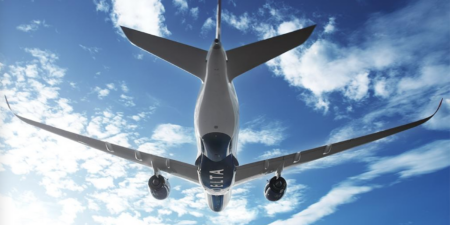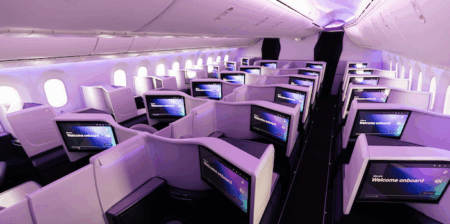The winners of the 11th Crystal Cabin Awards have been announced, with some really exciting developments emerging this year, including Bombardier, United Airlines and Delta Air Lines going directly head-to-head, and Airbus winning two trophies.
The awards, an initiative of Hamburg Aviation, were more international and more hotly contested than ever before, with 85 submissions from 21 countries. Major players in the industry were well represented, with Airbus alone having four entries make it to the final round.
The list of finalists for the Cabin Concepts category was especially glamorous this year, with contenders including Delta Air Lines’ Delta One Suite, an enclosed business class suite with privacy partitions, which is initially being implemented in Delta’s A350s. United Airlines’ Polaris business class was also in the running, with its innovative cabin configuration which offers all-aisle access seats in a density neutral layout, without compromising space or comfort. Also in contention for the best cabin concept was Bombardier with the cabin for its C Series, the first completely new short and medium-haul airliner for 30 years.
Honors went to Delta Air Lines for the Delta One Suite, a business class seat that creates a first class feel.
Cabin Systems
The award in the Cabin Systems category went to Diehl Aerospace for ‘Power Line Communication’, which allows “free-loading” of data flows using existing power cabling on board, resulting in materials savings and therefore weight savings.
Diehl was up against the Watchdog from Airbus, which addresses the problem of accidental activation of the emergency escape chutes on the ground when crew members open the aircraft doors, by using a sensor that warns whenever there is a movement near the door handle. Zodiac Aerospace was also in the running with a sensor: a cabin baggage management system for overhead compartments that sees lights on the lockers indicate free space for cabin baggage, as well as offering a little extra space for cases.
Electronic Systems
The Electronic Systems category was won by Global Eagle Entertainment. The US company has developed a complete entertainment portal that allows passengers to surf the internet, watch films and read magazines on their personal electronic devices.
Airbus made it to the finals in this category (thus being a finalist in four categories) with a radio-based wireless communication (WAIC – Wireless Avionics Intra-Communications) system that enables smoke detectors, lighting and temperature regulation to be controlled with a patented radio frequency. Meanwhile, Lufthansa Technik was competing with its ‘niceview mobile’ product, which offers passengers a way to follow their journey with interactive maps on their personal mobile devices.
Greener Cabin, Health, Safety and Environment
Major impact with minimal materials is key for the winner in the Greener Cabin, Health, Safety and Environment category. The Airbus ReTrolley can recycle and compress passengers as it is pushed through the cabin. The recycler on wheels is one of the start-up projects successfully supported by the Airbus BizLab accelerator program.
Other efficient and sustainable ideas in this category were GermFalcon, a cleaning device for cabins that uses ultraviolet C light to remove bacteria and viruses without the use of chemical agents, and the Revolution Toilet from Zodiac Aerospace which also aims to fight bacteria by using special vents, as well as saving water.
Materials & Components
In the Materials & Components category, Vanema in collaboration with Boxmark won with the Octaspring concept, which promises relief from the unpleasantness of sitting in an aircraft for long stretches of time through a series of individual foam springs which distribute the passenger’s weight evenly.
Runners-up in this category were the K-Reflexion Mirror from Krüger Aviation, a plastic mirror which can display safety announcements, product information and tips for the destination in the onboard lavatory, and Diehl Aircabin’s direct printing method that allows colors and patterns to be added to panels without having to remove them.
Passenger Comfort Hardware
Flexibility was the order of the day in the Passenger Comfort Hardware category, won by Airbus in collaboration with Recaro and THK for their Smart Cabin Reconfiguration. The innovation enables seats to be quickly repositioned by the cabin crew in response to the load factor of any particular flight.
Bombardier was also competing in the Passenger Comfort Hardware category, with its concept of barrier-free toilets for the CRJ range of aircraft. They were facing off with Diehl Comfort Modules, with its bar module that can be integrated into the galley in just a few simple steps, transforming a functional kitchen space into a bar or a duty-free sales counter within seconds.
University
It was all smiles for the Hamburg University of Applied Sciences (HAW) when the Smart Onboard Wheelchair concept won the University category, prevailing against two competitors from Delft University of Technology in the Netherlands. Thanks to a specially shaped seat, the wheelchair can be rolled directly over the on-board toilet, allowing the passenger to use the lavatory independently.
One of Delft University of Technology’s two finalists was ‘myseat’, the equivalent of a parking guidance system for passengers, accompanying them all the way from check-in to their seat using Bluetooth technology for a more structured boarding process. The other was the Revitalisation System, which turns the cabin seating upholstery into a game controller, with body movements controlling the on-board entertainment system for an in-seat workout.
At the official ceremony for the Crystal Cabin Awards, the importance of visionary thinking was underlined in the keynote speech by Neil Brooker, global director, strategic partnering, creative consulting and operations at BMW Designworks: “Visions not only require imagination and profound knowledge of future context, they must also be embedded in a company’s business processes and structure to ensure that the they do not get diluted on the way to implementation”.
Aircraft Interiors International magazine is a sponsor of the Crystal Cabin Awards.




